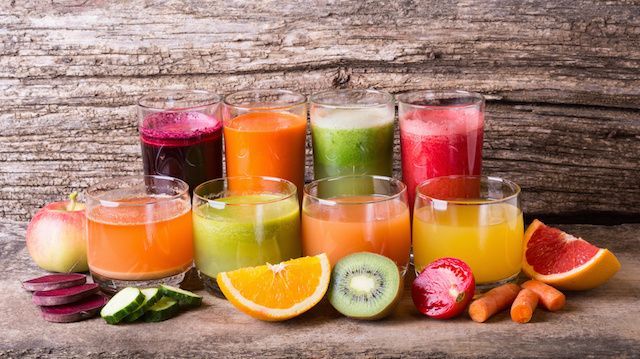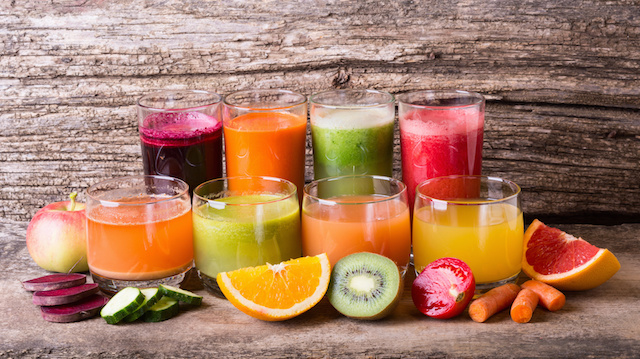
Crafting your own fruit juice at home with your apron tied and sun peering in through your kitchen window already sounds better than pulling a carton out of the fridge. Homemade fruit juice contains essential nutrients — beneficial vitamins and minerals that contribute to your overall health and wellness.
While store-bought juice does contain beneficial nutrients, it also contains a lot of sugar and preservatives. Pass the juice aisle, and head for the produce section for these homemade juice recipes.
Homemade fruit juice gives you more fruit
Homemade fruit juice offers multiple health benefits, and one of the best reasons to make your own fruit juice is your ability to mix and match various fruits. Imagine eating an apple, an orange and a kiwi all in one sitting. Yes, this is possible, but why not load all three into your blender and make an amazing fruit juice to give yourself a vitamin C boost.
The United States Department of Agriculture (USDA) recommends consuming two cups of fruit per day for people who are moderately active. More activity means more fruit, but it is wise to keep your calorie intake in check since some fruits are higher in calories than others. Concocting your own assortment of delicious fruit juices can help you improve and balance your intake of fruit.
Homemade fruit juice increases fiber intake
Homemade fruit juice is packed full of fiber. A lot of fiber is derived from the skins of your favorite fruits. A whole apple blended into your fruit juice boosts fiber by two grams according to the USDA. Fiber provides exceptional benefits, including healthy skin, weight control, prevention of stroke, heart health, and blood sugar balance.
A 2010 study published in Nutrients conducted at Kansas State University suggests, “Dietary fiber consists of many different constituents, however; some are of particular interest and include arabinoxylan, inulin, β-glucan, pectin, bran and resistant starches. These individual components of dietary fiber have been shown to significantly play an important role in improving human health.”
Higher fiber intake leads to better overall metabolic health. For some examples, raspberries contain 8 grams of fiber per cup, blackberries boast 7.6 grams, and pears (skin and all) contain 5.5 grams per fruit.
Homemade fruit juice improves digestive health and immunity
The fiber in homemade fruit juice also improves digestive health. As previously discussed, pairing a few high-fiber fruits is an excellent way to get your Daily Value (DV) of fiber in a healthy and refreshing drink. Dr. Mark Babyatsky at the Icahn School of Medicine at Mount Sinai notes, “Dietary fiber, found particularly in vegetables, fruits, beans, and whole grains, helps to keep bowel movements regular.”
A high-fiber diet can lead to better digestion, and our body’s ability to digest and remove waste is essential to overall health. Research conducted by Dr. James Lattimer titled “Effects of Dietary Fiber and its Components on Metabolic Health” (2010) suggests that proper digestion may be a key component in reducing the risk of obesity, diabetes, cardiovascular disease and cancer.
|
Homemade Immune-boosting Juice
|
| Prep Time: |
| 5minutes |
| Cook Time: |
| no cook |
| Total time: |
- 2medium oranges (peeled or squeezed)
- 2 kiwifruits (peeled and cubed)
- 1/2cup fresh blueberries
- Once you have prepped your delicious immune-boosting fruits, add them to a blender or juicer and get ready for an inviting taste.
- Add water as needed for desired consistency.
- Serve and enjoy!
Homemade fruit juice is more nutritious with no fake sugar
The fruit juice you purchase in the grocery store is chock-full of sugar and preservatives, but you can easily avoid these by blending up the fresh farmers’ market fruits you picked up over the weekend. For example, store-bought apple juice, pound for pound, contains more calories and almost as much sugar as a few of the soda drinks you have been avoiding in hopes of losing weight.
A study published in the Journal of Nutrition (2012) compares store-bought juice to homemade fruit juice. The study states, “Notably, we report that substituting one serving of homemade fruit juice for one serving of either or both SSB [sugar-sweetened beverage] may help lower the odds of MetS by 30%.” Avoiding artificial sweeteners, which cause metabolic syndrome, by drinking fresh, homemade fruit juice is a big step in the right direction. Take control of what sugary additives you drink and keep it fresh and healthy with a bit of DIY fruit juice.
|
Homemade Vitamin-blast Juice
|
| Prep Time: |
| 5minutes |
| Cook Time: |
| nocook |
| Total time: |
- 1medium apple (peeled and cubed)
- 2medium pears (peeled and cubed)
- 1 kiwifruit (peeled and cubed)
- With your fresh fruits peeled and cubed, place them into a blender and add half a cup of water.
- Blend until smooth to a consistency you prefer. You can even save a small kiwifruit slice to garnish the cup and impress your guests.
- Serve and enjoy!
Homemade fruit juice boosts antioxidants
 Antioxidants play a key role in our mental and physical health. Antioxidants are responsible for neutralizing free radicals (which cause several serious diseases including cancer) as well as supporting a healthy immune system and increasing mental health.
Antioxidants play a key role in our mental and physical health. Antioxidants are responsible for neutralizing free radicals (which cause several serious diseases including cancer) as well as supporting a healthy immune system and increasing mental health.
There have been multiple studies on the benefits of antioxidants, including a 1999 study published in the Monthly Journal of the Association of Physicians. The study found, “The health protection provided by fruit and vegetables could arise through an integrated reductive environment delivered by plant antioxidants of differing solubility in each of the tissue, cellular and macromolecular phases.”
Notable fruits rich in antioxidants are raspberries, blueberries, blackberries, grapes, pineapples, strawberries and mangos. You can mix and match all of these fruits to make delicious homemade fruit juice.
|
Homemade Super-antioxidant Juice
|
| Prep Time: |
| 5minutes |
| Cook Time: |
| nocook |
| Total time: |
- 1cup fresh blueberries
- 1cup fresh strawberries (halved or chopped)
- 1large fresh mango (peeled and chopped)
- Add your fresh ingredients to your blender with about half a cup of water, or whatever you desire for your preferred consistency.
- Blend until smooth.
- Save a small slice of mango for a garnish to impress your family and guests.
- Pour and enjoy!
Homemade fruit juice contains vitamins, minerals and fiber, and it is far more delicious than any store-bought juice, which contains preservatives, additives and sugar. Take your juice to the next level and find a new recipe that you, your family, and your friends can enjoy.
—Stephen Seifert
Stephen Seifert is a writer, professor, adventurer and a health & fitness guru. His flair for travel and outdoor adventure allows him to enjoy culture and traditions different than his own. A healthy diet, routine fitness and constant mental development is the cornerstone to Stephen’s life.
Sources:
http://www.choosemyplate.gov/printpages/MyPlateFoodGroups/Fruits/food-groups.fruits-amount.pdf
http://www.ncbi.nlm.nih.gov/pmc/articles/PMC243148/pdf/aem00215-0024.pdf
http://www.ncbi.nlm.nih.gov/pubmed/10627873
http://www.ncbi.nlm.nih.gov/pmc/articles/PMC3257631
http://www.everydayhealth.com/digestive-health/experts-why-is-fiber-important.aspx
http://www.ncbi.nlm.nih.gov/pmc/articles/PMC3349979

